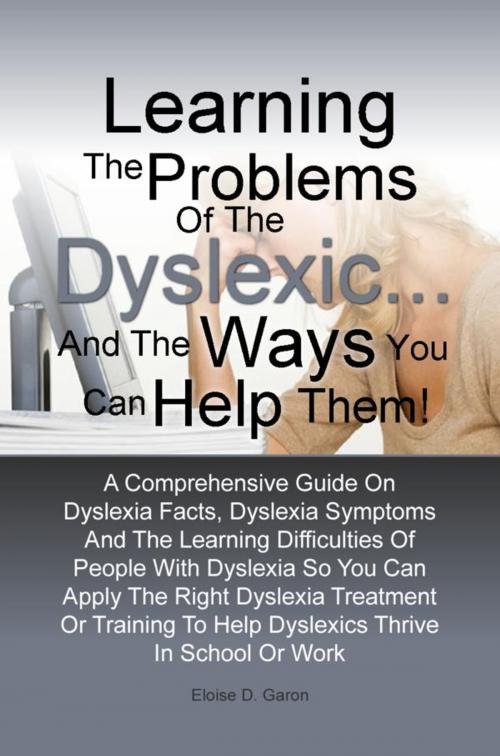Learning The Problems of the Dyslexic … and the Ways You Can Help Them!
A Comprehensive Guide On Dyslexia Facts, Dyslexia Symptoms And The Learning Difficulties Of People With Dyslexia So You Can Apply The Right Dyslexia Treatment Or Training To Help Dyslexics Thrive In School Or Work
Nonfiction, Family & Relationships, Parenting, Child Development, Reference & Language, Education & Teaching, Special Education, Learning Disabled, Special Needs| Author: | Eloise D. Garon | ISBN: | 1230000022710 |
| Publisher: | KMS Publishing | Publication: | October 8, 2012 |
| Imprint: | Language: | English |
| Author: | Eloise D. Garon |
| ISBN: | 1230000022710 |
| Publisher: | KMS Publishing |
| Publication: | October 8, 2012 |
| Imprint: | |
| Language: | English |
Dyslexia is a learning disability in children which can persist all the way to adulthood and throughout their lifetime if no proper intervention is provided.
People with dyslexia find it extremely difficult to read, write and spell even though they are intelligent and have an average IQ. Other than this disability, dyslexic people are normal and healthy individuals overall.
Children and adults with dyslexia are not mentally retarded. They have no brain disorders. They do not lack intelligence. In fact, many famous and successful people are dyslexic.
What they do have is an impairment. Their brain has a weak ability to interpret the images sent by their eyes and ears into understandable language. This impairment can be mild or severe and can either be temporary or can stay with them permanently through life. The key to treatment, therefore, is early intervention. The sooner the symptoms are treated, the better the condition can improve.
Early intervention can be difficult because diagnosing dyslexia is not easy. The symptoms can be easily missed by the teacher and parents. Out of insecurity, the child normally opts to suffer in silence and not tell his parents until he becomes grown-up and understands that what he has is a learning problem and then seeks intervention himself.
There are many treatment options for people with dyslexia. For children, early diagnosis is significant for a better outcome. For adults, it is never too late to learn to improve your learning skills.
Dyslexia is a learning disability in children which can persist all the way to adulthood and throughout their lifetime if no proper intervention is provided.
People with dyslexia find it extremely difficult to read, write and spell even though they are intelligent and have an average IQ. Other than this disability, dyslexic people are normal and healthy individuals overall.
Children and adults with dyslexia are not mentally retarded. They have no brain disorders. They do not lack intelligence. In fact, many famous and successful people are dyslexic.
What they do have is an impairment. Their brain has a weak ability to interpret the images sent by their eyes and ears into understandable language. This impairment can be mild or severe and can either be temporary or can stay with them permanently through life. The key to treatment, therefore, is early intervention. The sooner the symptoms are treated, the better the condition can improve.
Early intervention can be difficult because diagnosing dyslexia is not easy. The symptoms can be easily missed by the teacher and parents. Out of insecurity, the child normally opts to suffer in silence and not tell his parents until he becomes grown-up and understands that what he has is a learning problem and then seeks intervention himself.
There are many treatment options for people with dyslexia. For children, early diagnosis is significant for a better outcome. For adults, it is never too late to learn to improve your learning skills.















